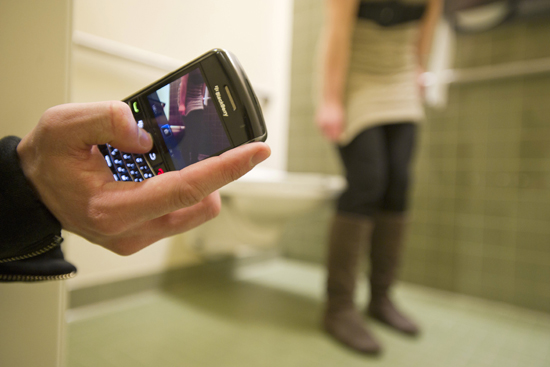Third Peeping Incident in a Month
BU Police ask students for help

BU police have received three reports in the past month of smartphone peeping in women’s residence hall showers. Photo by Cydney Scott
Smartphones are convenient, pocket-sized gadgets that allow users to snap pictures or record videos on the fly, and in the wrong hands they can be dangerously invasive devices—especially on a college campus.
That was the case early Friday morning when a woman showering at Warren Towers spotted an iPhone on the floor, apparently recording her. When she tried to squash the device with her foot, she cut it on a jagged tile. As she did, a hand reached into the shower and grabbed the phone. The suspected photographer immediately fled the bathroom.
Friday’s peeping incident marks the third time in the past month that women have reported surreptitious shower photographers to the Boston University Police Department. Two other peepings occurred in women’s showers in Claflin Hall, one on January 22 and the other three days later.
No suspects have been identified, and Scott Paré, deputy director of public safety and BUPD deputy chief, says at this point police have little to go on. “There’s not enough right now to relate them or say it’s the same person,” he says. Officials are continuing to investigate the incidents and encourage anyone with more information to share it with the police at 617-353-2121.
Under Massachusetts law, photographing, videotaping, or electronically surveilling people without their knowledge or consent is punishable by up to two and half years in prison, a $5,000 fine, or both. Distributing such images could slap another five years and $5,000 on the penalty.
On the national front, several states have updated their voyeurism and privacy laws in response to deviant use of new technology. California has one of the toughest privacy statutes, covering high-tech intrusions taken “under and through the clothing” or with “a visual or auditory enhancing device,” such as night-vision goggles.
Overseas, Japanese officials have seen an alarming spike in what’s called “smartphone voyeurism.” More than 1,700 cases were reported last year, a 60 percent increase over 2006, according to its National Police Agency.
Paré advises students to take extra precautions. Roommates and friends could look out for one another in the showers, and dorm residents should always scan hallways and bathrooms for suspicious people.
“A lot of times it’s just that one person that raises the hair on the back of your neck,” Paré says. “Most of the time your intuitions are correct.”
Call the Boston University Police, at 617-353-2121, with information about these or similar incidents, or anonymously text the BUPD at 847411.
Comments & Discussion
Boston University moderates comments to facilitate an informed, substantive, civil conversation. Abusive, profane, self-promotional, misleading, incoherent or off-topic comments will be rejected. Moderators are staffed during regular business hours (EST) and can only accept comments written in English. Statistics or facts must include a citation or a link to the citation.